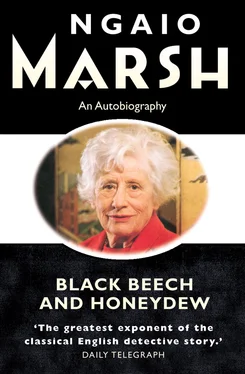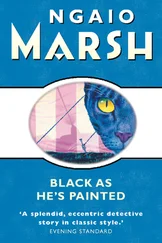Ngaio Marsh - Black Beech and Honeydew
Здесь есть возможность читать онлайн «Ngaio Marsh - Black Beech and Honeydew» — ознакомительный отрывок электронной книги совершенно бесплатно, а после прочтения отрывка купить полную версию. В некоторых случаях можно слушать аудио, скачать через торрент в формате fb2 и присутствует краткое содержание. Жанр: unrecognised, на английском языке. Описание произведения, (предисловие) а так же отзывы посетителей доступны на портале библиотеки ЛибКат.
- Название:Black Beech and Honeydew
- Автор:
- Жанр:
- Год:неизвестен
- ISBN:нет данных
- Рейтинг книги:4 / 5. Голосов: 1
-
Избранное:Добавить в избранное
- Отзывы:
-
Ваша оценка:
- 80
- 1
- 2
- 3
- 4
- 5
Black Beech and Honeydew: краткое содержание, описание и аннотация
Предлагаем к чтению аннотацию, описание, краткое содержание или предисловие (зависит от того, что написал сам автор книги «Black Beech and Honeydew»). Если вы не нашли необходимую информацию о книге — напишите в комментариях, мы постараемся отыскать её.
Black Beech and Honeydew — читать онлайн ознакомительный отрывок
Ниже представлен текст книги, разбитый по страницам. Система сохранения места последней прочитанной страницы, позволяет с удобством читать онлайн бесплатно книгу «Black Beech and Honeydew», без необходимости каждый раз заново искать на чём Вы остановились. Поставьте закладку, и сможете в любой момент перейти на страницу, на которой закончили чтение.
Интервал:
Закладка:
II
It seems to me now that in those early days my father was a kind of a treat: that I enjoyed him enormously without being involved with him. It was my mother who had the common but appalling task of ‘bringing me up’ and who had to steer an uncharted course between the nervous illogic of a delicate child, prone to fear, and the cunning obstinacy of a little girl determined to give battle in matters of discipline. Here she is, suddenly, running in a preoccupied manner across the lawn from the garden gate where she has said goodbye to a caller. She runs with a graceful loping stride, unhampered by her long skirt: brown stuff with brown velvet endorsements. I watch her from the dining-room window and twiddle the acorn end of the blind cord. She looks up and sees me and a smile, immensely vulnerable, breaks over her face. How dreadfully easy it is to love and hurt her. I adored, defied and finally obeyed my mother and believed that she understood me better than anyone else in my small world.
It was a very small world indeed: a nurse called Alice, whom I don’t remember and who must have left me when I was still a baby, a maid called May who had a round red face and was considered a comic, my maternal grandparents, my parents and their circle of friends. A cat called Susie and a spaniel called Tip.
Quite early in the day I learned to laugh at my father: not unkindly but because it was impossible to know him well and not to think him funny. He thought himself funny when his oddities were pointed out to him. ‘I didn’t!’ he would say to my mother. ‘How you exaggerate! I did not, Betsy.’ And break out laughing. It was, in fact, impossible to exaggerate his absent-mindedness or the strange fantasies that accompanied this comic-opera trait in his character.
‘My saddle-tweed trousers have gone!’ he announced, making a dramatic entrance upon my mother and a luncheon guest.
‘They can’t have gone.’
‘Completely. You go and look. Gone! That’s all.’
‘How can they have gone?’
My father made mysterious movements of his head in the direction of the dining room and May.
‘Taken them to give that chap,’ he whispered. May had a follower.
‘Oh, no, Lally. Nonsense.’
‘All right! Where are they? Where are they?’
‘You haven’t looked properly.’
He stared darkly at her and retired. Doors and drawers could be heard angrily banging. Oaths were shouted.
‘Are they gone, do you suppose?’ asked our visitor who was a close friend.
‘No,’ said my mother composedly.
My father returned in furious triumph. ‘Well,’ he sneered, ‘that’s that. That’s the end of my saddle-tweed trousers.’ He laughed shortly. ‘You won’t get cloth like that in New Zealand.’
‘They must be somewhere.’
He stamped. His eyes flashed. ‘They are not somewhere,’ he shouted. ‘That damn’ girl’s stolen them.’
‘Ssh!’
My father’s nostrils flared. He opened his mouth.
‘What are those things on your legs, my dear chap?’ asked our guest.
My father looked at his legs. ‘Good Lord!’ he said mildly, ‘so they are.’
Early one morning he met Susie, our cat, walking in the garden. He carried her to my mother who was not yet up.
‘Look, Betsy,’ he said. ‘I found this cat walking in the garden. Isn’t she like Susie?’
‘She is Susie,’ said my mother.
‘I thought you’d say that,’ he rejoined, delightedly. Susie purred and rubbed her face against his. ‘She’s awfully tame. You’d think she knew me, wouldn’t you?’ asked my father.
‘It is Susie,’ said my mother on a hysterical note.
He smiled kindly at her and put Susie down. ‘Run along, old girl,’ he said. ‘Go home to your master.’
My mother was now laughing uncontrollably.
‘Don’t be an ass, Betsy,’ said my father gently and left her.
It must not be supposed that he was an unintelligent man. He was widely read, particularly in biology and the natural sciences, was an enthusiastic rationalist and a member of the Philosophical Society. He was also an avid reader of fiction. Of the Victorians, he most enjoyed Dickens and Scott. My mother disliked Scott because of his historical inaccuracies and bias. None of his novels was in the house. She deeply admired Hardy and once told me that after reading the end of Tess, she sat up all night, imprisoned in distress and unable to free herself. In later years we all three read and discussed the Georgian novelists. My mother’s favourites were Galsworthy (with reservations: she thought Irene a stuffed dummy) and Conrad. Almayer’s Folly she read over and over again. Somehow her copy of this novel has been lost. I would like to discover why it so held her. My father’s favourite was Aldous Huxley though he often remarked that the chap was revolting for the sake of being revolting and that Point Counter Point gained nothing by its elaborate form. He was more gregarious in his reading than my mother and would sometimes devour a ‘shilling shocker’. His hand trembled and his pipe jigged between his teeth as he approached the climax. ‘Frightful rot!’ he would say. ‘Good Lord! Regular Guy Boothby stuff,’ and greedily press on with it.
When I was about four years old, I was given a miniature armchair made of wicker and a children’s annual. I remember dragging the chair on to the lawn, seating myself, opening the book and thinking furiously, ‘I will read. I will read.’ After some boring, but I fancy, brief, struggles with The Dog Has Got a Bone and a beastly poem about reindeer, I went forward under my own steam and became an avid bookworm.
My parents never stopped me reading a book though I believe my mother was at pains to see that nothing grossly ‘unsuitable’ was left in my way. The criterion was style: ‘He could write well,’ my mother said of the forgotten William J. Locke, ‘but he pot-boils. Very second-rate.’ I became something of an infant snob about books, and, like my father, felt a bit below par when I read Chums and Buffalo Bill, but continued, at intervals, to do so.
My father was English and my mother a New Zealander. She was the one, however, who doggedly determined that I should not acquire the accent. ‘The cat,’ I was obliged interminably to repeat, ‘sat on the mat and the mouse ran across the barn.’ ‘The cart,’ my father would interrupt in a falsetto voice, ‘sart on the mart arnd the moose rarn across the bawn.’ I thought this excruciatingly witty and so did my mother but by these means the accent was held at bay.
Читать дальшеИнтервал:
Закладка:
Похожие книги на «Black Beech and Honeydew»
Представляем Вашему вниманию похожие книги на «Black Beech and Honeydew» списком для выбора. Мы отобрали схожую по названию и смыслу литературу в надежде предоставить читателям больше вариантов отыскать новые, интересные, ещё непрочитанные произведения.
Обсуждение, отзывы о книге «Black Beech and Honeydew» и просто собственные мнения читателей. Оставьте ваши комментарии, напишите, что Вы думаете о произведении, его смысле или главных героях. Укажите что конкретно понравилось, а что нет, и почему Вы так считаете.










